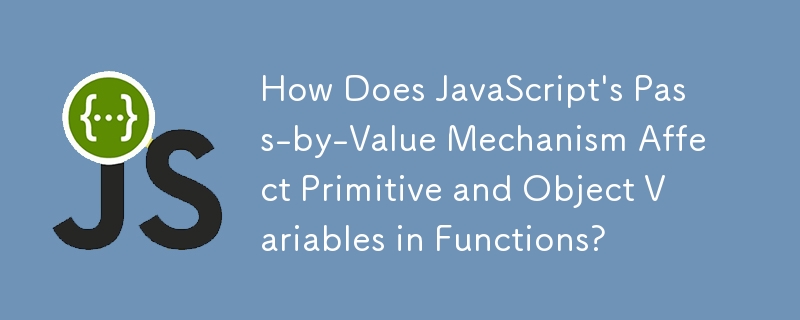Home >Web Front-end >JS Tutorial >How Does JavaScript's Pass-by-Value Mechanism Affect Primitive and Object Variables in Functions?
How Does JavaScript's Pass-by-Value Mechanism Affect Primitive and Object Variables in Functions?
- Mary-Kate OlsenOriginal
- 2024-12-18 04:34:17303browse

Understanding JavaScript's Pass by Reference vs. Pass by Value
In JavaScript, parameters passed to functions are always passed by value. This means that a copy of the original value is created, and the original value is not affected by any changes made to the copy. However, when the value is an object (including arrays), the copy created is a reference to the original object.
This concept affects the behavior of variables when they are modified within functions:
- Primitive values (e.g., numbers, strings): When a primitive value is passed as an argument and modified within the function, the original value outside the function remains unchanged.
- Objects (e.g., arrays, objects): When an object is passed as an argument and modified within the function, the original object outside the function also gets modified. This is because even though the function receives a copy of the original object, it's actually a reference to the same underlying object in memory. Modifying the properties of the referenced object within the function, therefore, affects the original object outside the function.
For example:
function f(a, b, c) {
a = 3; // Re-assigns a to a new primitive value
b.push("foo"); // Adds a new property to b, modifying the referenced object
c.first = false; // Modifies a property of the referenced object
}
In this example, x, y, and z outside the function will have the following values: x remains unchanged at 4 (primitive value), y now has the additional property ["foo"] (object property added), and z.first is set to false (object property modified).
To create a fully independent copy of an object, it's necessary to explicitly copy all of its properties to a new object. This can be done using the Object.assign() method or by traversing the object and creating a new object with new properties based on the old ones.
The above is the detailed content of How Does JavaScript's Pass-by-Value Mechanism Affect Primitive and Object Variables in Functions?. For more information, please follow other related articles on the PHP Chinese website!
Related articles
See more- An in-depth analysis of the Bootstrap list group component
- Detailed explanation of JavaScript function currying
- Complete example of JS password generation and strength detection (with demo source code download)
- Angularjs integrates WeChat UI (weui)
- How to quickly switch between Traditional Chinese and Simplified Chinese with JavaScript and the trick for websites to support switching between Simplified and Traditional Chinese_javascript skills

